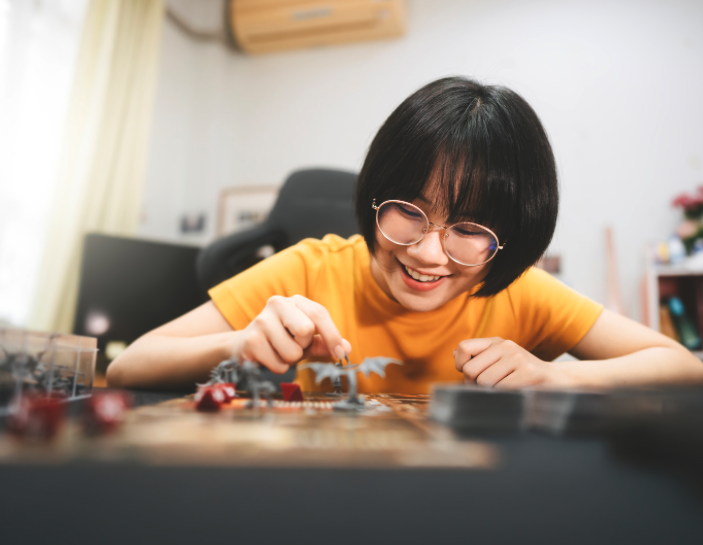Mental health mastery through Dungeons & Dragons role-play
Residences & Programming • Written by: Cornerstones of Maine

Written by Sabrina Marshall, Business Development Manager with client contributions
*client name has been changed for confidentiality purposes*
Introduction:
Our transitional living program is clinically driven, but the magic of our therapeutic work tends to present outside of the traditional therapy office. The immersive therapeutic milieu and experiential model in our houses create a welcoming space for our clients to engage in group activities that can be a powerful conduit for therapeutic growth. These activities are often created and led by our Cornerstones coaches and therapists, but often they become led and created by clients. These groups and activities provide a myriad of benefits, such as providing our clients with a sense of autonomy and developing skills like task initiation, planning, interpersonal connection, and character building.
Unveiling the Healing Power of Dungeons & Dragons
A new client-led group at Cornerstones is the Dungeons & Dragons group. Dungeons & Dragons, also known as DnD or D&D, is a role-playing game (RPG) that is cooperative and strategic in nature in tandem with creative thinking and storytelling. One player is assigned the role of Dungeon Master (DM), who provides the scaffolding of the imaginary world for all players including the terms of the missions, tasks, and challenges they will face. What players choose to do with the information provided by the DM is left up to the individual player, creating a “choose your own adventure” dynamic.
Ted, a West End client, expressed his interest in starting a D&D group with his Life Skills Coach after connecting with fellow peers also interested in playing. “There are so many cool and interesting people here and I think it would be a great way to build community and create options to connect with others outside of scheduled programming. It’s a fun experience to get together and play in a pretend reality too.”
Therapeutic Insights: Dungeons & Dragons and Mental Health
Many researchers believe role-play in a clinical and non-clinical setting can be attributed to psychosocial growth. Studies have shown that the use of RPGs such as Dungeons and Dragons, could be used as an intervention-based approach to improve mental health by reducing levels of depression, stress, anxiety, and loneliness.
A qualitative study from 2021 utilized narrative inquiry to understand the experiences of thirteen players recovering from mental health difficulties and identified the following themes to be linked to D&D having a direct impact on their well-being:
-
Experiencing through characters
-
Skill building
-
Finding space & relief from their mental health symptoms
-
Safely engaging with mental health difficulties that arise
-
Building relationships
Client-Led D&D Groups at Cornerstones
Ted envisions the group meeting at a communal space such as the Portland library or a community center. The invitation would be open to anyone interested in joining, including those who have never played D&D and Cornerstones Alumni who remain in the community. “I have experience as a Dungeon Master and over time have come to the realization that I really enjoy teaching. I encourage players not to take the game too seriously. We build a story together and I challenge players to solve problems that arise, but the solution is entirely up to them. It is really cool seeing the creative routes players take.”
The “Session Zero” meeting for the D&D group has been scheduled, which is a time that Ted will get folks together to brainstorm a storyline and figure out individual interests for character development. The group will also set a collective intention in terms of what they all want to get out of the game. We look forward to watching the evolution of the D&D group and allowing a space for imaginative expression, problem-solving, and collaboration!
Conclusion:
Cornerstones' embrace of Dungeons & Dragons as a therapeutic tool reflects a commitment to holistic well-being and client autonomy. The D&D group offers not just entertainment but also a platform for meaningful connections, skill development, and imaginative expression.
Reference:
Baker, I. S., Turner, I. J., & Kotera, Y. Role-play Games (RPGs) for Mental Health (Why Not?): Roll for Initiative. International Journal of Mental Health and Addiction, 1-9. https://doi.org/10.1007/s11469-022-00832-y

